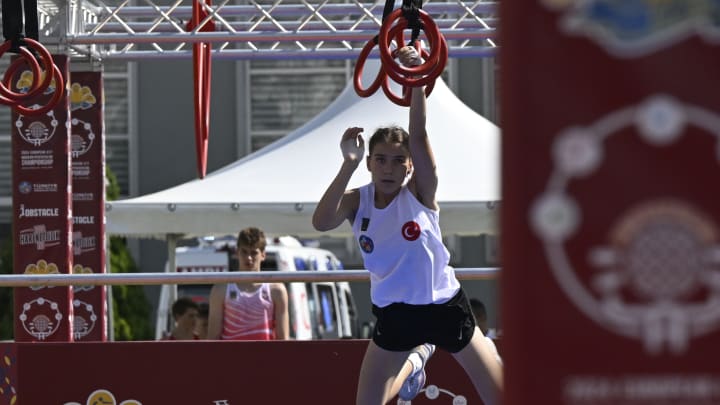SI:AM | This Is the End of Modern Pentathlon As You Know It

Good morning, I’m Dan Gartland. Here’s one last reminder to subscribe to the daily Olympics podcast I’m doing with Mitch Goldich.
In today’s SI:AM:
🤢 Swimming in the Seine
🇺🇸 An amazing track comeback
🏈 NFL preseason preview
It’s about to get more modern
One of the most obscure, widely mocked and controversial sports on the Olympic program made its Paris Games debut on Thursday: modern pentathlon.
When modern pentathlon was added to the Olympic program in 1912, it was intended to be a test of the skills required by a soldier at the time: running, swimming, sword fighting, shooting and horseback riding. But in the 21st century, the sport seems hilariously antiquated. That’s changing somewhat, though, as the sport will have a distinctly modern twist at the next Olympics.
The equestrian portion of the modern pentathlon in Tokyo was a disaster. Horses have always been assigned to riders at random in the modern pentathlon, and in 2021 the athletes struggled mightily to get their horses to cooperate. (Competitors are assigned their horses just 20 minutes before the competition begins.) Germany’s Annika Schleu had been leading the competition before the show jumping portion but her horse refused to go over any of the jumps. Schleu was in tears on the back of the horse as she saw her medal chances evaporate. Her coach, Kim Raisner, was seen punching the horse and was subsequently sent home from Tokyo. Schleu finished 31st out of 36 competitors after receiving zero points for the show jumping portion.
Schleu was not the only rider who had a tough time with the randomly assigned horse. Between the riders’ struggles, Raisner’s controversial punch and the general impression that the modern pentathlon was not so modern anymore, the sport’s governing body decided in November 2021 to remove the equestrian portion from the competition. When the organizing committee for the 2028 Los Angeles Olympics announced its initial list of sports a month later, modern pentathlon wasn’t among them. In November 2022, World Pentathlon announced that an obstacle course—similar to what you’d see on American Ninja Warrior—would be the new fifth event. About a year after that announcement, modern pentathlon was officially added to the Los Angeles program, ensuring that the sport’s Olympic streak would continue.
But that means that this is the final year that this version of the modern pentathlon will be on display. Competition began Thursday with the fencing ranking round and will continue on Friday with the men competing in the swimming, fencing bonus round and—for the final time—show jumping. The women will do those events on Saturday, while the men’s competition will wrap up on Saturday with the combined running/shooting event known as the laser run. The women will do the laser run on Sunday.
World Pentathlon is hoping that ditching the equestrian event will increase the sport’s popularity. Replacing it with the obstacle run is part of a growing trend in the Olympics to add truly modern events intended to appeal to younger viewers, like breaking, skateboarding and surfing.
From that perspective, it seems like a slam dunk to attract more eyeballs to one of the most overlooked Olympic sports. Fans will surely enjoy watching athletes navigate an obstacle course more than they enjoy watching them try to guide an unfamiliar horse over a series of jumps.
But the athletes themselves have split opinions about the new format. Some athletes have formed a group called Pentathlon United that seeks to preserve the current format.
“The sport getting back in, that’s brilliant. Athletes will have an Olympic experience. That’s wonderful. I wouldn’t want to take that away from anybody,” British Olympian and Pentathlon United member Kate Allenby told the Associated Press last year. “But the question is this: Is the sport (still) pentathlon if it’s got obstacle racing in it? Because it’s an entirely different athlete.”
Others are more amenable to the changes.
“I don’t think it is necessarily a bad thing,” Greg Whyte, who won silver in the event for Great Britain in 1994, told The Guardian in 2021. “Back in the day, the fencing part alone used to take 14 hours, while in Paris the whole event will last just 90 minutes. All sports evolve, and no sport is immune from change in the modern TV era.”
The best of Sports Illustrated
- Much of the focus was on the water quality for the women’s open-water swim in Paris on Thursday morning, but Pat Forde writes that the swimmers also had to deal with a really strong current.
- Forde also wrote about American Sarah Hildebrandt’s chaotic path to a wrestling gold medal after her expected opponent was disqualified for missing weight.
- The best moment on the track on Wednesday was American Quincy Hall’s stunning comeback in the men’s 400m. Greg Bishop has more on Hall’s incredible win.
- One of the biggest stars in Paris on Wednesday was 51-year-old skateboarder Andy McDonald. He didn’t even come close to contending, but it didn’t matter, Stephanie Apstein writes.
- Conor Orr has a list of seven things to pay attention to during Week 1 of the NFL preseason.
- Longtime NBC swimming announcer Rowdy Gaines says he will retire after the 2028 Olympics.
- The White Sox have fired manager Pedro Grifol as they careen toward the worst record in modern baseball history.
The top five…
… things I saw yesterday:
5. Orioles rookie Jackson Holliday’s go-ahead home run against the Blue Jays. The 20-year-old is now the youngest player in AL history to homer in three straight games.
4. The German men’s handball team’s buzzer beater to defeat France.
3. The Serbian men’s water polo team’s buzzer beater to defeat Greece.
2. American Kenneth Rooks’s surprise silver medal finish in the 3,000m steeplechase.
1. Quincy Hall’s comeback win in the 400m.
